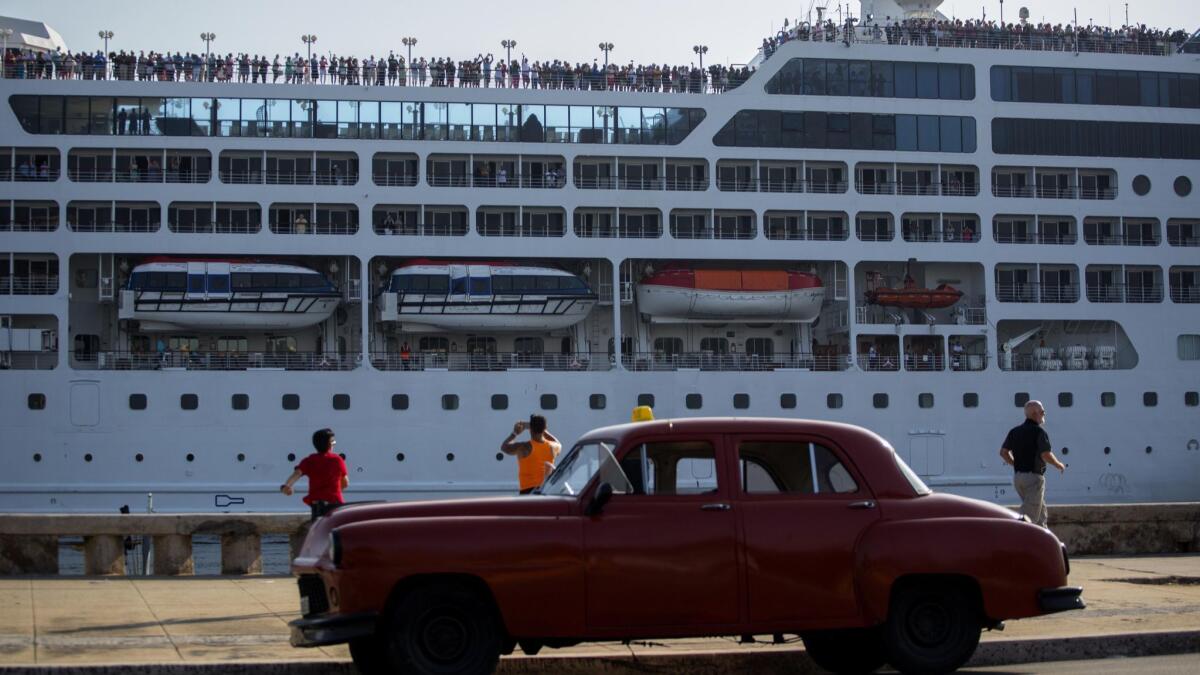Myths, facts and gray areas that will complicate your Cuba travel plans

- Share via
Cuba has a mystique about it, so it’s no surprise that myths surround travel there.
That may be even truer this month after regulations were changed by the Trump administration. Some of the regulations have been interpreted strictly, some more liberally. Here is our “myth, fact or unclear” primer on travel to this complicated island nation.
You can travel to Cuba. Fact. The new regulations did not end travel there. They may change the way you travel there because…
You cannot travel to Cuba by cruise ship. Fact. Cruises stopped calling in Havana almost immediately after the changes were issued earlier this month. Cruise ship travel was an easy way to visit Cuba, a sort of sampler platter, as it were, that allowed visitors to see a little bit of the country and mingle with its people.
You still can travel to Cuba if you were signed up for a trip before the June 5 deadline. Fact. Here is what the Office of Foreign Assets Control, or OFAC, said in the announcement about new regulations: “OFAC’s regulatory changes include a ‘grandfathering’ provision, which provides that certain group people-to-people educational travel that previously was authorized will continue to be authorized where the traveler had already completed at least one travel-related transaction (such as purchasing a flight or reserving accommodation) prior to June 5, 2019.”
If you weren’t signed up before June 5, you may still be able to go on a people-to-people group trip from a travel provider. Unclear. Within the travel industry, there is some discussion that the phrase “will continue to be authorized where the traveler had already completed at least one travel-related transaction” might also apply to travel providers. That is pending clarification.
Going forward, though, it’s no longer enough to learn about the Cuban people and their culture in what was classified as people-to-people travel. Fact. The new regulations changed that; now, the closest category is “support for the Cuban people,” which is one of 12 license categories.
“It’s similar to people to people,” said Kendra Guild, director of product and operations for SmarTours, based in New York. But the schedule of activities is more intense, she said, and that’s a challenge and a challenging pace for some travelers to maintain. It’s certainly no vacation, which travel to Cuba is not supposed to be.
You can’t go to Cuba as a foreign independent traveler. Myth. You can if you are a “very, very savvy traveler,” said Janet Moore, who, in her capacity as owner of Distant Horizons of Long Beach, has been to Cuba dozens of times with groups.
Another concern, said Manny Kopstein, owner of the Cuba Travel Adventures Group, which also does philanthropic work in Cuba, is that “most people don’t think about the repercussions.”
Record-keeping is part of what independent travelers will be asked to do. If travelers aren’t thinking about the consequences of their actions (or inactions), will they “keep records of their expenditures and actions to avoid running afoul of the restrictions?” he asked.
If a store in Cuba is open and doing business, you can patronize it. Myth. You may buy a bottle of mineral water, Moore said, and you may unwittingly have done business with a banned entity.
You can find that list at bit.ly/cubarestrictions, but you’ll need to commit it to memory to ensure that you’re not doing business with a company tied to the government or the military.
If you can book online with certain companies, it must be OK to do business with them. Myth. Gran Hotel Manzana Kempinski, a newish hotel in Havana, has a beautiful website, but it’s on the “no” list.
Nothing will happen if you color outside the lines because there’s no enforcement mechanism. Partly myth and partly fact. Here’s what’s true: The enforcement mechanism is weak. Here is what is not true: Nothing will happen.
In the history of Cuba travel, different administrations have made an example of offenders. Zachary Sanders of New York was fined $6,500 for a trip he made when he was 23 in 1998. Fourteen years later, he settled, Reuters reported.
After the new regulations were announced, travel company Expedia was fined $325,000 for violating U.S. sanctions between 2011 and 2014, Travel Weekly reported.
“But, the Treasury Department said, despite being a sophisticated international travel company, Expedia ‘failed to exercise a minimal degree of caution’ to avoid violating anti-Cuba sanctions,” Travel Weekly reported.
Which again raises this question: Should you skip Cuba? Embrace it with fervor? Put it off for a while? Put it off forever? The only one who can answer that is you — and that’s as it should be when so much else is not.
Have a travel question, problem or dilemma? Write to travel@latimes.com. We regret we cannot answer every inquiry.
More to Read
Sign up for The Wild
We’ll help you find the best places to hike, bike and run, as well as the perfect silent spots for meditation and yoga.
You may occasionally receive promotional content from the Los Angeles Times.







